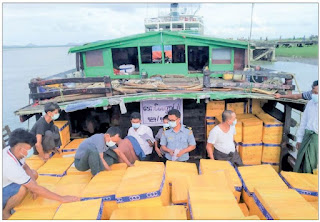Myanmar exports over 1,000 tonnes of fishery products to Bangladesh monthly
May 31
THE State is
prioritizing agriculture and livestock sectors with an aim to increase foreign
currency earnings and enhance the socio-economy of the farmers. Myanmar’s
monthly export of fishery products to Bangladesh via border posts in Rakhine
State is estimated at 800 to over 1,000 tonnes.
In April, Bangladesh’s
demand for fishery products dropped during Ramadan. Starting from the first
week of May, bilateral trade is bustling with the steady supply by the rohu
farmers from Yangon, Ayeyawady and Bago regions by ship or vehicle.
Although the high and
volatile fuel oil prices force the transport sector to raise the fares, the
price of fishery products does not escalate. The traders are facing
difficulties to raise the price of marketable fish amid the high feed price.
Nevertheless, they are endeavouring to keep the export of fishery products
steady while there is a strong demand.
Approximately 1,000
tonnes of rohu from Yangon city are delivered to Sittway and Maungtaw border
posts in Rakhine State with Bangladesh. Rohu from the other two cities is also
sent to the border via sea route and road transport.
“Those fish farmers
working on a manageable scale convey the fish to Sittway and Maungtaw border
areas by means of road transport and then load the fish and other commodities
on motor vessels for export. Fish farmers from Yangon deliver fish by vessels
and send them directly to Bangladesh’s seaport of entry after passing tests at
the Sittway checkpoint. They have to wait for five days in the sea to run a
health test to enter Yangon. Despite the hike in oil prices, the contract keeps
the breeders going regularly. We see a regular trade flow. Bangladesh’s border
plays a crucial for the fish farmers. It is a win-win situation for both the
fish farmers and the consumers if the marketable fish are harvested and
exported. This month, about 800 to over 1,000 tonnes of fishery products are
flowing into the border market,” said U Thet Oo, director of the Rakhine State
Fisheries Department.
A combined team
conducts checks on fishery products and other commodities at two border posts
with Bangladesh; the Shwemingan point in Sittway city and Kanyinchaung point in
Maungtaw town.
Myanmar levied a two
per cent tax on exported goods to Bangladesh. Additionally, the registration of
a vessel is charged US$50 and the weighted average price for the fishery is set
at five US dollars per tonne under the Marine Fisheries Law.
The fish farmers and
traders from Bangladesh were battered by a temporary closure of the border
posts triggered by the COVID-19 pandemic. To facilitate the trade flow, the
Rakhine State government requested the National Level Central Committee on
Prevention, Control and Treatment of the COVID-19. The committee gave the green
light and the border trade resumed after a four-month closure. This move
allowed the fish breeders from three big cities to do a roaring business.
Rohu and other dried
commodities such as onion, tamarind, ginger, and dried plum are shipped to
Bangladesh through Rakhine State, while wide striped longyi for men (Palaykat
Sarong), plastic gallon containers, footwear and construction materials are
imported to Myanmar. Exports surpass imports in cross-border trade between
Myanmar and Bangladesh.
Myanmar exported over
11,000 tonnes of commodities to Bangladesh in the past sixmonth mini-budget
period (Oct 2021-Mar 2022). The exports generated an income of over US$11
million which indicated a significant increase compared to those figures ($4.7
million-$5.3 million) recorded in the same corresponding period of the previous
years. Fishery product exports grew and foreign currency earnings increased.
Rakhine State witnessed
a sluggish trade with Bangladesh in April and border trade raised its head
again in May, full of lively activities. Up to 1,000 tonnes of fishery products
were exported to Bangladesh this month. — Nyein Thu (MNA)/GNLM

No comments